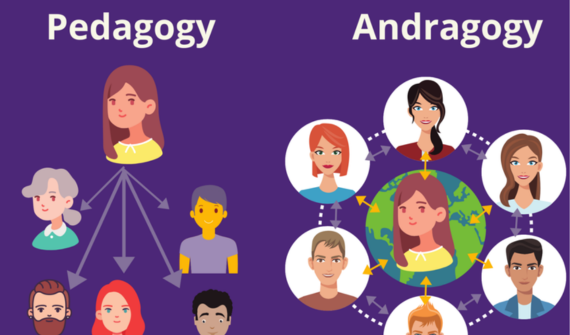Mastering the Six Andragogy Principles for Effective Adult Learning
Learning is not just for children and young adults.
As we grow older, we continue to seek knowledge and skills that will enhance our personal and professional lives.
The andragogy principles, or adult learning, can help trainers and educators effectively engage with adult learners.
By understanding the unique needs and characteristics of adult learners, trainers can design and deliver effective learning experiences that lead to successful outcomes.
In this article, we will explore the six andragogy principles and how they can be applied in practice to create a more effective learning environment for adult learners.
What Are Andragogy Principles?

Andragogy principles refer to a set of guiding principles for teaching adult learners.
The term "andragogy" was first coined by Malcolm Knowles in 1968, and it emphasizes that adults have different learning needs and preferences than children.
The six principles of andragogy are self-directed learning, prior experience, readiness to learn, problem-solving, relevance, and motivation.
These principles are essential for designing effective adult education programs that meet the unique needs of adult learners.
Understanding and implementing andragogy principles can lead to better engagement, retention, and application of knowledge in the workplace or other adult learning environments.
Benefits Of Adult Learning Methodologies

There are many benefits to using adult learning methodologies in education and training.
1. Increased Engagement
Adult learning methodologies actively involve learners, which increases their engagement in the learning process.
When learners are actively engaged, they are more likely to absorb and retain information.
2. Relevant And Practical Learning
Adult learners are typically more interested in learning information that is relevant to their job or personal goals.
These methodologies are designed to deliver practical information that learners can apply immediately.
Adult learners can easily connect with life experiences.
3. Customized Learning Experiences
Adult learners have unique learning needs and preferences.
By using these methodologies, trainers can customize learning experiences to meet the needs of each individual learner.
4. Improved Retention
These methodologies incorporate techniques that help learners retain information more effectively.
For example, repetition, reflection, and application activities help learners retain information and apply it to real-life situations.
Studies have shown that adult learners have an attention span of approximately 20 minutes.
To ensure that they can absorb the information presented, it is important to chunk the training material and provide regular breaks.
This way, learners can process and retain the information better.
5. Increased Confidence
They are designed to be learner-centered, which helps learners feel more confident in their ability to learn and apply new skills.
6. Greater Transferability Of Skills
They focus on developing transferable skills that learners can apply in multiple contexts.
This helps learners develop a deeper understanding of the skills they are learning and increases their ability to transfer those skills to different situations.
Overall, using Knowles's principles of adult learning can lead to more effective and impactful learning experiences for learners of all ages and backgrounds.
Knowles Principles Of Adult Learning

According to 2021 statistics, 10.8% of individuals between the ages of 25 and 64 in the European Union had engaged in education or training within the past four weeks.
The 6 principles of andragogy, as proposed by Malcolm Knowles, are essential for effective adult learning.
Here, we'll dive into each principle in detail to understand how it can be applied to adult education.
1. Self-Concept
Adult learners have a self-concept of being responsible for their own decisions and lives.
They have a wealth of experiences that influence their learning, and they prefer to apply these experiences to the learning process.
As an educator, it's important to recognize and respect the learner's experiences and allow them to apply their learning to real-world situations.
2. Experience
Adults have accumulated a vast amount of experience over their lives, which can be utilized to facilitate learning.
It's important to incorporate the learners' experiences into the learning process to make the material more relevant and meaningful.
3. Readiness To Learn
Adult learners are ready to learn when they see the value and relevance of the material.
They have specific goals and objectives for learning, which should be taken into consideration when designing learning activities.
As an educator, you need to create an environment that promotes readiness to learn and provides opportunities for learners to apply what they have learned.
4. Orientation To Learning
Adult learners are more motivated to learn when the material is problem-centered, rather than content-oriented.
They prefer to learn in a social context, where they can share their experiences and collaborate with others.
As an educator, it's important to provide opportunities for collaborative learning and to incorporate real-world problems into the learning process.
5. Motivation
Adult learners are motivated to learn when the material is relevant to their personal and professional goals.
They are self-directed and prefer to set their own goals and objectives for learning.
As an educator, it's important to recognize the learners' motivation and provide opportunities for them to set their own goals and objectives.
6. Learning Styles
Adult learners have different learning styles, and it's important to take these into consideration when designing learning activities.
Some learners prefer visual aids, while others prefer hands-on activities.
As an educator, you should provide a variety of learning activities that cater to different learning styles.
By understanding and applying Knowles principles of adult learning, educators can create effective and engaging learning experiences for adult learners.
Types Of Adult Learning Styles
Adult learners have unique needs and preferences when it comes to how they learn.
Here are four types of adult learning styles:
1. Visual Learners
Visual learners prefer to learn through visual aids such as images, diagrams, and videos.
They tend to remember information better when it's presented in a visual format.
2. Auditory Learners
Auditory learners prefer to learn through listening.
They may benefit from lectures, discussions, and podcasts. They tend to remember information better when it's presented in an auditory format.
3. Kinesthetic Learners
Kinesthetic learners prefer to learn through hands-on activities and experiences.
They may benefit from role-playing, simulations, and other interactive exercises.
They tend to remember information better when they can physically engage with it.
4. Reading/Writing Learners
Reading/writing learners prefer to learn through written materials such as textbooks, manuals, and articles. They may benefit from taking notes and writing summaries.
They tend to remember information better when they can read and write about it.
Understanding adult learning styles can help educators tailor their teaching methods and materials to better meet their students' needs.
It can also help adult learners identify the most effective strategies for their own learning.
Revolutionize Your Learning Experience With Oreed
Oreed is an all-in-one education intelligence platform that provides an enhanced learning experience for everyone.
Our platform is designed to meet the needs of any audience, including employees, customers, partners, or learners.
Here are some of the features that set us apart:
1. Craft Effective Courses
Oreed's intelligent management system and engaging learning experiences enable you to craft courses that leave a lasting impact.
Our authoring tools make it easy for you to customize your courses to fit your specific needs.
2. Measure The Impact
Measuring the effectiveness of your courses is crucial to ensure successful training.
Oreed provides you with detailed analytics and reporting tools to track the progress of your learners and the effectiveness of your training programs.
With our analytics and reporting tools, you can measure the impact of your training efforts, identify areas for improvement, and optimize your programs for even greater success.
3. Effortless Learning
Say goodbye to snooze-inducing learning methods with Oreed.
We're on a mission to redefine learning by offering an efficient platform that makes education effortless and available.
Our platform is designed to enhance the learning experience, no matter who your audience is.
4. Accessible Education
Education is the cornerstone of success, and we believe in making it accessible to everyone, everywhere.
Oreed's user-friendly interface and intuitive design provide a seamless learning experience, ensuring that anyone can benefit from our platform.
Join us on our mission to shake things up and revolutionize the way we learn with Oreed!
Promote lifelong learning through Oreed by experiencing the most powerful all-in-one training and development intelligent platform that streamlines all your organization's learning, training, and development activities in one place.
Final Thoughts
In conclusion, understanding and applying the six andragogy principles can significantly improve the effectiveness of adult learning.
By considering the unique needs and characteristics of adult learners, educators, and trainers can create an engaging and meaningful learning experience that resonates with the learners.
Additionally, incorporating various adult learning styles and techniques, such as multimodal approaches and experiential learning, can enhance the learning experience and help learners achieve their desired goals.
By mastering the andragogy principles, educators, and trainers can ensure that adult learners acquire the knowledge and skills they need to succeed in their personal and professional lives.
FAQs
1. Why is andragogy important in teaching adults?
Andragogy is essential in teaching adults because it is a learning theory that focuses on the specific needs and characteristics of adult learners.
Unlike children, adult learners have their own unique experiences, knowledge, and expectations when it comes to learning.
Andragogy recognizes these differences and helps educators tailor their teaching methods to meet the needs of adult learners.
By applying the principles of andragogy, educators can create more effective and engaging learning experiences for adult learners.
2. What is the concept of andragogy?
Andragogy is a learning theory that focuses on the characteristics and needs of adult learners. It is based on the premise that adult learners are self-directed and have a wealth of experiences that can be tapped into to enhance their learning.
According to andragogy, adults prefer to learn through problem-solving and active participation in the learning process.
This approach to learning emphasizes practical applications of knowledge and skills, rather than just memorization of information.
It is often contrasted with pedagogy, which is the approach to teaching children.
3. What is the aim of andragogy?
The aim of andragogy is to create effective learning experiences for adult learners.
Andragogy recognizes that adults have unique characteristics and needs, such as prior experience, motivation, and self-direction, that need to be taken into account when designing and delivering learning experiences.
The ultimate goal of andragogy is to help adult learners achieve their learning objectives and improve their performance in their personal and professional lives.
By applying these principles, educators can create more effective and engaging learning experiences for adult learners, leading to improved knowledge retention and application.